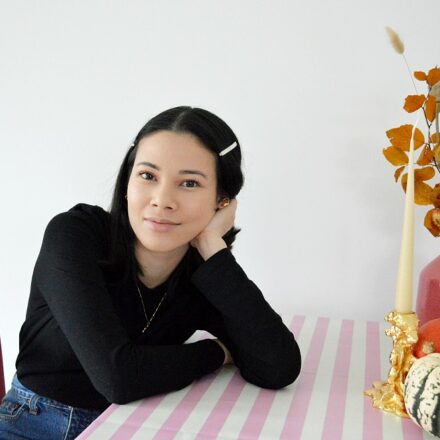By Kayla Voigt
The average American moves homes or apartments more than 10 times in their lifetime.
But furniture and décor often can’t come with them. In large metropolitan cities like New York, Los Angeles or London, you’ll likely see abandoned couches, dressers, bed frames and more lining the streets. There’s a reason Boston locals call September 1—the most common day leases turn over in the city—a second Christmas. In the United Kingdom alone, more than 22 million furniture items are discarded every year.

Entrepreneur Julia Anduiza wants to change that. “In the U.K., we throw away 300,000 tons of furniture in a year that could otherwise be reused,” she says. “In London, where I live, you can walk around and find these amazing pieces out on the street just because someone wanted something new. A lot of people have heard of fast fashion, but fast furniture is just as much an issue.”
A better way to decorate
Anduiza founded Shelff, a furniture rental platform, in 2021 after growing frustrated with throwaway culture for home décor. “I built it as a way for people to access beautiful and iconic home pieces and at an affordable price for the short term,” says Anduiza.
After moving six times in the span of five years across London, Anduiza found herself wanting to make her new apartments feel like home. “When I moved into my first apartment, it was the first time I needed Christmas décor, but it was such a small space I knew I wouldn’t be able to reuse it when I moved again,” she says. “I thought, Why can’t I just get this for a month, instead of buying something that won’t last?”
With a self-described eclectic style—“a mix of Scandi, minimalism, space-age, midcentury, all mixed together with playfulness”—she’s always been passionate about hunting down interesting antique and vintage treasures for her spaces. She founded the first iteration of Shelff entirely on Instagram, buying and selling vintage pieces while juggling a full-time position in human resources.
I keep seeing and hearing about all of these items people want and need but can’t access. I don’t think buying should be the only option.
—Julia Anduiza, founder of Shelff
“I started doing everything manually on an Instagram page, which was the shopfront. If someone wanted to buy a piece, they could fill out a form through a link in my profile and fill in the items they wanted,” she says. “I also had space where they could upload images of items they wanted to lend. As much as it was hard work to manage, I wanted to test out my idea and the process, and it worked incredibly well.”
It quickly outgrew the social media platform with so much demand for secondhand and rental pieces—and Shelff was born.
“I started working on it straight away after that initial success,” she says. “I keep seeing and hearing about all of these items people want and need but can’t access. I don’t think buying should be the only option.”
A thriving rental community

Increasingly, shoppers want more vintage and secondhand options when it comes to decorating their homes. It’s predicted to grow into a $16.6 billion business by 2025, with big-box retailers like Ikea, Pottery Barn and Wayfair all looking to offer vintage or secondhand items as part of their online presence. Vintage-only site 1stDibs received more than $170 million in funding before going public in 2021. The site, and other competitors like Chairish, boast millions of shoppers interested in a more sustainable supply chain and also in one-of-a-kind items.
Unlike these resale sites, Anduiza hopes to create connections between renters and lenders to stop the cycle of constantly buying new or new-to-you items. “Not everyone can afford to change their décor all the time, and if people are mobile, they don’t need to buy something just for a certain period of time,” she says. “They can rent instead and still find those great pieces.”
Shelff works as a peer-to-peer furniture sharing platform, allowing people to rent out their unused furniture or décor for a set period instead of tossing it or putting it in storage. On Shelff, renters can log in and search the library of furniture items, from small fixtures like lamps and vases to statement pieces like sofas and dining tables. From there, they can request the item from the lender for a designated time frame and arrange payment, delivery, or pickup with lenders in a secure channel.
Shelff launches to Londoners this March
Anduiza already launched a beta program, open to Londoners, as a team of one—working on it at night and on the weekends. “Right now, I’m starting small,” she says. “I’m working with Londoners who are primarily in the homeware and furniture business to make this the best it can be. I’m hoping this will give me enough traction to raise more funds and show that this is really something people want and need.”
But London is just the beginning. Anduiza has her eye on building a global presence for the brand, including the United States, where 12 million tons of furniture get thrown away every year. While furniture rental isn’t new, it’s never taken off in a peer-to-peer model. “There [feels like] no alternative to buying right now,” she says. “For Shelff, I’ve been taking a systematic approach to my goals, really thinking about what worked and what didn’t over the last year, so that people get the most out of it.”
“I’ve always been the type of person doing something on the side and trying new things,” she says. “I’ve really been prioritizing connecting with the community, both lenders and renters, to speak with them and what they’re looking for as I put more processes and structure in place.”
As a member of DWEN (Dell Women’s Entrepreneur Network), Anduiza is able to connect with other entrepreneurs and test out her idea. “It’s been so useful for accessing resources for entrepreneurs, participating in talks with inspiring women, and discovering other women-owned businesses to support,” she says.
Her focus is on creating a community, partnering with furniture designers and other eco-minded businesses to inspire people to live a more sustainable lifestyle. “We are changing the way we see and relate to ownership,” says Anduiza. “I want people to think about their spaces and their homes differently, and make sustainable home décor more accessible for everyone.”

